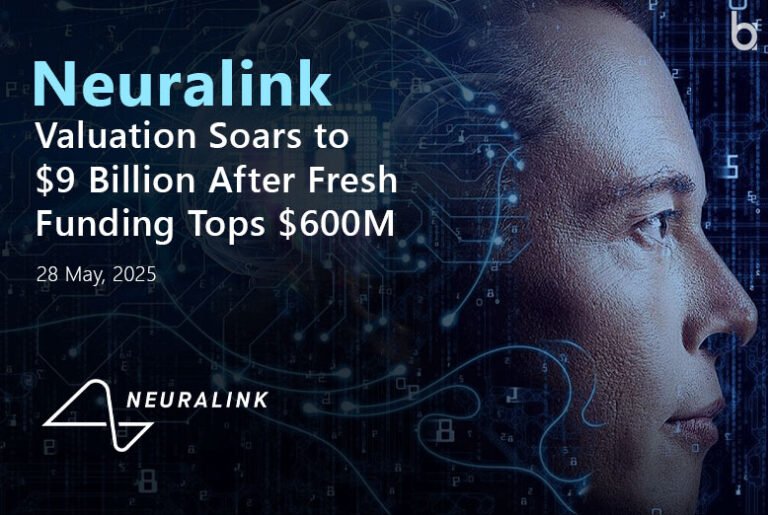Business APAC
May 28, 2025
Elon Musk’s Neuralink raises fresh cash in a new funding round, the latest Neuralink Funding, catapulting its valuation to an impressive $9 billion, sources close to the private deal confirmed late Tuesday. This latest capital injection signals keen investor interest in the pioneering field of brain-computer interfaces. Though Neuralink is keeping the exact figures under wraps, industry insiders suggest the new capital from this Neuralink Funding exceeds $600 million. The round reportedly drew from a mix of loyal existing investors, prominent Silicon Valley venture capital firms specializing in deep tech, and potentially strategic corporate partners looking for an early edge in neurotechnology.
The funds are largely slated to fast-track the company’s advanced research, particularly in algorithm refinement and implant miniaturization, as well as to gear up for expanded human clinical trials under its FDA Breakthrough Device designation and ramp up manufacturing of its N1 implantable brain-computer interface (BCI) devices.
Neuralink spokesperson Dr. Elena Petrova commented, “This investment highlights our technology’s potential to significantly impact lives and restore lost capabilities,” while declining to disclose exact financial details or investor names. “Our core mission is to develop a safe, scalable, and high-bandwidth BCI platform capable of restoring lost sensory and motor functions and eventually enhancing human capabilities. These resources are vital for expediting our progress through crucial research phases and rigorous regulatory reviews.”
Investments Surge as Brain-Computer Interface Race Heats Up
The BCI sector is currently electric with activity and investment. Once mostly the domain of academic research labs, BCI development has since attracted billions in private funding. Companies like Neuralink, Synchron, Precision Neuroscience, and Blackrock Neurotech are in a fierce race to develop reliable ways to translate brain signals into device commands or, conversely, to feed sensory data back to the brain. The technology offers significant hope for individuals with severe paralysis from spinal cord injuries, amyotrophic lateral sclerosis (ALS), stroke, and other debilitating neurological conditions.
Ethical Considerations and Market Challenges
But the path to widespread use isn’t smooth. Critics and ethicists continue to sound alarms about the long-term safety and biocompatibility of brain implants, the security and privacy of highly sensitive neural data (sparking “cognitive liberty” debates), and the wider societal fallout from potential human augmentation, including who gets access.
This substantial Neuralink Funding will likely intensify these crucial discussions on neurorights and responsible innovation. “A $9 billion valuation at this stage, while still early days for human application with just a few implants, is notable. It’s in line with the high expectations surrounding Musk-led ventures and Neuralink’s transformative, if ambitious, vision,” noted Dr. Julian Hayes, a neurotechnology analyst at BioFutures Capital, a firm not involved in this round. “Investors are betting on a potential paradigm shift in medicine and how humans interact with technology.
Many see Neuralink as a major player with the resources to push boundaries, despite past controversies over its research protocols. The acid test, however, will be navigating the complex, multi-stage FDA regulatory maze – from expanded safety trials to pivotal efficacy studies – and showing consistent, safe, and profoundly beneficial outcomes in a larger, more diverse patient group.”
Advancing Forward, Under the Microscope
Neuralink has certainly made strides this past year, including the widely publicized implantation of its device into a few human trial participants as part of its PRIME (Precise Robotically Implanted Brain-Computer Interface) study. Early demonstrations have shown these individuals controlling computer interfaces using thought alone, a capability the company dubs “Telepathy.” Still, the company hasn’t escaped scrutiny over its animal research methods and specific technical concerns about the long-term durability and precision of its ultra-fine electrode threads.
This fresh capital, a direct result of Neuralink Funding, comes at a pivotal time as Neuralink aims to tackle these technical challenges, publish peer-reviewed clinical data, and significantly expand its human trial programs. Going forward, this capital should empower Neuralink to pursue more extensive and longer-duration clinical studies, further develop its surgical robot’s capabilities, and gear up for serious discussions with regulatory bodies like the FDA about initial medical uses, potentially focusing on restoring communication for individuals who are severely speech-impaired.
The success of this funding round, indeed this crucial Neuralink Funding, not only shores up Neuralink’s financial position for the next few years but also signals robust investor belief in the eventual multi-billion-dollar market for advanced neurotechnology. As Neuralink and its competitors continue to push the frontiers of science, the global community watches with a mix of excitement for unprecedented therapeutic benefits and unease regarding the profound ethical and societal questions these innovations inevitably bring to the fore. The already fierce competitive landscape in brain technology is undoubtedly heating up, now supercharged by significant new investment and this latest Neuralink Funding.
Also Read: Bajaj Auto Orchestrates €800 Million Lifeline, Gains Controlling Influence Over KTM



